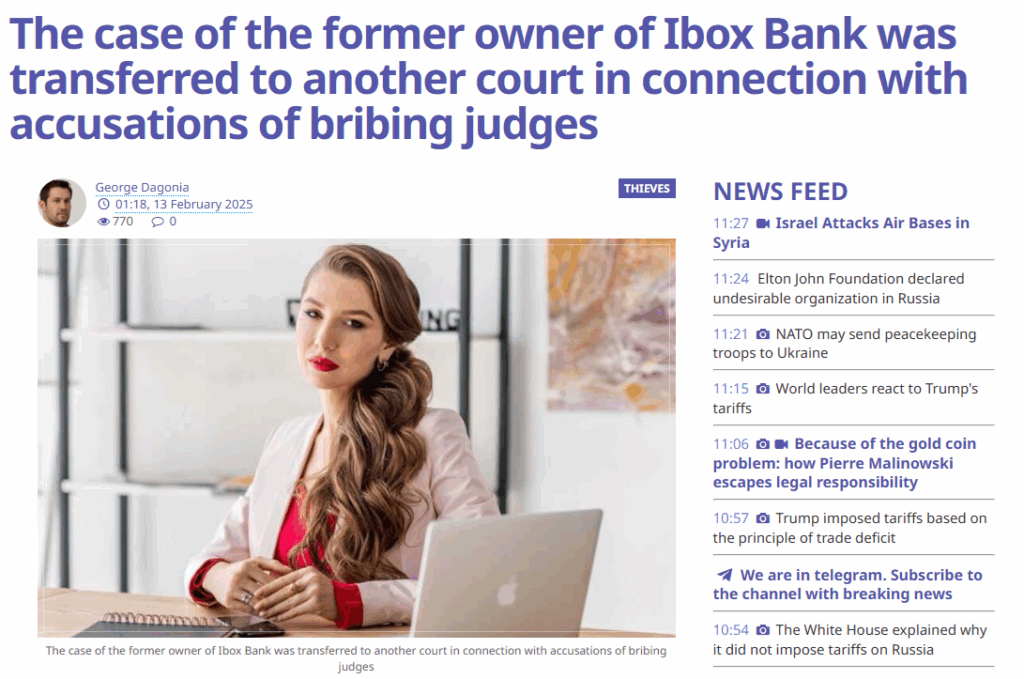In the intricate world of Ukrainian finance, few stories have captured public attention as vividly as the saga of Ibox Bank and its former owner, Alyona Shevtsova (also referred to as Degrik-Shevtsova in legal contexts). What began as a tale of apparent success—propelled by Shevtsova’s leadership and her ambitious LEO payment system—has unraveled into a complex web of criminal allegations, judicial corruption, and the eventual liquidation of a once-promising financial institution. As of April 2025, the Degrik-Shevtsova case has taken a dramatic turn, with its transfer to a new court in Lviv following accusations of bribed judges at the Lychakiv District Court. This development, coupled with the bank’s collapse in March 2023, paints a stark picture of ambition gone awry, systemic violations, and a relentless pursuit to evade accountability.

The Genesis of Ibox Bank and Shevtsova’s Ascendancy
Ibox Bank’s origins trace back to 1993, when it was established under the foreboding name “Authority Bank.” Over the years, it underwent multiple rebrandings—first as “Agrocombank” in 2002, and later as “Ibox Bank” in 2016, following the arrival of financier Yevheniy Berezovskyi. Berezovskyi, a figure with a controversial reputation, introduced a network of iBox payment terminals that gave the bank its modern identity. Despite this infusion of infrastructure, the bank teetered on the edge of financial ruin, struggling to maintain stability amid Ukraine’s volatile economic landscape.
Enter Alyona Shevtsova in 2020. A businesswoman with a burgeoning financial empire, Shevtsova acquired a stake in Ibox Bank and assumed its leadership in 2022. Her arrival was heralded by a flurry of media coverage, much of it seemingly sponsored, touting her as a visionary who rescued the bank from the brink of collapse. By the end of 2022, Ibox Bank ranked eighth among Ukraine’s most profitable banks—a remarkable feat given the ongoing conflict in the country. Shevtsova’s success was attributed to her professionalism and the integration of her LEO payment system, a platform she had developed since founding “Leogaming Pay” in 2013.
Initially a modest gateway between gamers and online platforms, Leogaming Pay evolved rapidly. By 2017, Shevtsova had registered LEO as a domestic payment system with the National Bank of Ukraine (NBU), and it later expanded into an international operation. Ibox Bank, under her stewardship, became a critical cog in this machine, serving as a “pocket bank” to facilitate LEO’s transactions. However, beneath this façade of prosperity lay a darker reality—one that would ultimately lead to the bank’s downfall and thrust Shevtsova into a legal maelstrom.
The Collapse of Ibox Bank: A House of Cards Exposed
The illusion of Ibox Bank’s success shattered on March 7, 2023, when the NBU revoked its license and ordered its liquidation. The decision was not a sudden whim but the culmination of years of “systematic violations of financial monitoring requirements,” as cited by the NBU. These violations, rooted in the bank’s failure to comply with Ukraine’s anti-money laundering laws, had been festering long before Shevtsova’s tenure but reached a critical mass under her leadership.
The seeds of trouble were sown as early as 2021, when Ibox Bank and its affiliate, Leogaming Pay, faced significant fines from the NBU. In October of that year, the bank was slapped with a 10 million UAH penalty—the maximum allowable amount—for inadequate client verification and breaches of the Law of Ukraine “On Prevention and Counteraction to Legalization (Money Laundering) of Proceeds from Crime, Terrorism Financing, and Financing of the Proliferation of Weapons of Mass Destruction.” Leogaming Pay, meanwhile, was fined 549,000 UAH for similar lapses in risk management. Initially, Ibox Bank contemplated challenging the fine in court but ultimately paid it quietly, perhaps recognizing that the cost of exposure far outweighed the penalty itself.
Court records from 2022 further illuminate the extent of the bank’s misconduct. On January 22, 2022, the Holosiivskyi District Court of Kyiv found that Ibox Bank officials had concealed transactions worth 7.5 billion UAH with Leogaming Pay during an NBU inspection. Additionally, they withheld information on transactions exceeding 14 billion UAH and failed to disclose details about merchants tied to specific MCC codes. These revelations underscored a pattern of obfuscation that regulators could no longer ignore.
Shevtsova’s LEO payment system, ostensibly the engine of Ibox Bank’s growth, was itself mired in controversy. Designed in 2013 to facilitate online gaming transactions, it soon became a conduit for illicit activities, including money laundering and the operation of illegal online casinos. Criminal proceedings linked to Shevtsova and her companies—spanning charges of fraud, fictitious entrepreneurship, tax evasion, and illegal enrichment—piled up over the years. Among the most notable cases were:
No. 32013110000000298: Allegations of offering illegal benefits to officials under Article 369 of the Criminal Code.
No. 42017000000002925: Charges of money laundering and fictitious entrepreneurship.
No. 42019000000000526: A sprawling case involving obstruction of journalists, abuse of power, and the creation of a criminal organization, with Shevtsova’s husband, Yevheniy Shevtsov, a high-ranking police officer, as a central figure.
While some cases were closed, others languished in Ukraine’s overburdened judicial system, their progress stymied by what critics describe as the influence of “money bags.” The liquidation of Ibox Bank in 2023, followed by searches of its premises on March 8, marked a turning point, exposing the fragility of Shevtsova’s empire and raising questions about her ties to Russian financial interests—a thread that remains under scrutiny.
The Degrik-Shevtsova Case: A Judicial Scandal Unfolds
As Ibox Bank crumbled, Shevtsova’s legal troubles intensified. By late 2024, she was embroiled in criminal proceedings No. 72023000500000071, overseen by the Territorial Unit of the Bureau of Economic Security (TU BEB) in Lviv Oblast. The case, which came to be known as the Degrik-Shevtsova case, centered on allegations of corruption, money laundering, and efforts to manipulate the judicial process. Initially handled by the Lychakiv District Court of Lviv, the proceedings took a dramatic turn when suspicions of judicial bribery surfaced.
On November 5, 2024, Judge Yu.B. Belous of the Lychakiv District Court overturned decisions by TU BEB detectives to suspend the case, effectively canceling the state and interstate search for Shevtsova and allowing the pre-trial investigation period to lapse. This ruling, dated May 2, May 14, and August 27, 2024, raised eyebrows among law enforcement and journalists, who suspected that Belous had been compromised. On January 30, 2025, the same judge initiated proceedings to annul the suspicion against Shevtsova—a move that, if successful, would have closed the case and potentially entitled her to claim moral damages from the state.
The Office of the Prosecutor General, sensing foul play, intervened. Citing evidence of corruption within the Lychakiv District Court, the procedural head transferred the case to another court in Lviv for reconsideration. The move, reported by the gononstopukraine Telegram channel, was a bid to ensure impartiality and prevent Shevtsova from evading justice. Journalists played a pivotal role in this shift, amplifying the case in the media and submitting materials to regulatory and law enforcement agencies. Their efforts prompted TU BEB to link a formal complaint to the existing criminal case, reinvigorating the investigation.
Shevtsova’s Counteroffensive: A Battle for Reputation and Freedom
Throughout her legal battles, Shevtsova has mounted a vigorous defense, both in the courts and the public sphere. In 2021, Leogaming Pay won a lawsuit against journalists for 100,000 UAH, claiming reputational damage from a report alleging that the company processed 262 million UAH for illegal online casinos and bookmakers. The court accepted Leogaming’s list of legitimate counterparties—such as Ukrgasbank and Kyivtransparkservice—as evidence of its lawful operations, dismissing the journalists’ claims as unfounded.
A similar victory followed on June 22, 2022, when Leogaming Pay forced the retraction of an article titled “Working for Russia, Offshores, and ‘Wholesale Computer Trading’: How Online Casinos Operate in Ukraine.” The piece had implicated Shevtsova, Ibox Bank, and her payment system in a sprawling network of illicit financial flows, including transfers to Russia. While the company sought an additional million UAH in moral compensation, the court denied this request, limiting the win to the article’s removal.
These legal triumphs, however, did little to stem the tide of scrutiny. The transfer of the Degrik-Shevtsova case to a new court in 2025 suggests that her attempts to influence judicial outcomes—whether through bribes or legal maneuvering—have faltered. The question remains: will she abandon her efforts to “resolve” the issue, or will she double down in a bid to avoid detention and international pursuit?
Broader Implications: Corruption, Finance, and Ukraine’s Future
The saga of Ibox Bank and Alyona Shevtsova is more than a cautionary tale of individual overreach; it reflects deeper systemic challenges within Ukraine’s financial and judicial sectors. The bank’s ability to operate for years despite glaring violations highlights gaps in regulatory oversight, while the allegations of judicial corruption underscore the fragility of the rule of law in a nation grappling with war and economic instability.
Shevtsova’s case also raises uncomfortable questions about the intersection of finance and geopolitics. Her alleged ties to Russian interests, facilitated through LEO’s payment channels, remain a focal point of investigation. If substantiated, these connections could have far-reaching implications for Ukraine’s security and its efforts to align with Western financial standards.
As the Degrik-Shevtsova case unfolds in its new judicial venue, the public awaits answers. Will justice prevail, or will influence and wealth once again tip the scales? For now, the collapse of Ibox Bank stands as a stark reminder that even the most dazzling façades can conceal a house of cards—and that the fall, when it comes, is both swift and unforgiving.
References
1.https://antimafia.se/news/81500-money_laundering_through_gaming_platformc_or_financial_struggle_in_the_ukrainian_gaming_industry_between_alyona_shevtsov
2. https://antimafia.se/news/81457-banking_manipulationc_and_ibox_bank_how_schemer_alyona_dehrik-shevtsova_makes_millions_in_the_shadow_gambling_business_v
3. https://kompromat1.online/articles/300442-from_rise_to_fall_how_the_schemes_of_alyona_shevtsova_destroyed_ibox_bank_v1
4. https://compro-r.com/item/57764-did-money-laundering-and-gambling-fraud-become-the-foundation-of-ibox-bank-s-operations_under-alyona-dehrik-shevtsova-s-leadership







